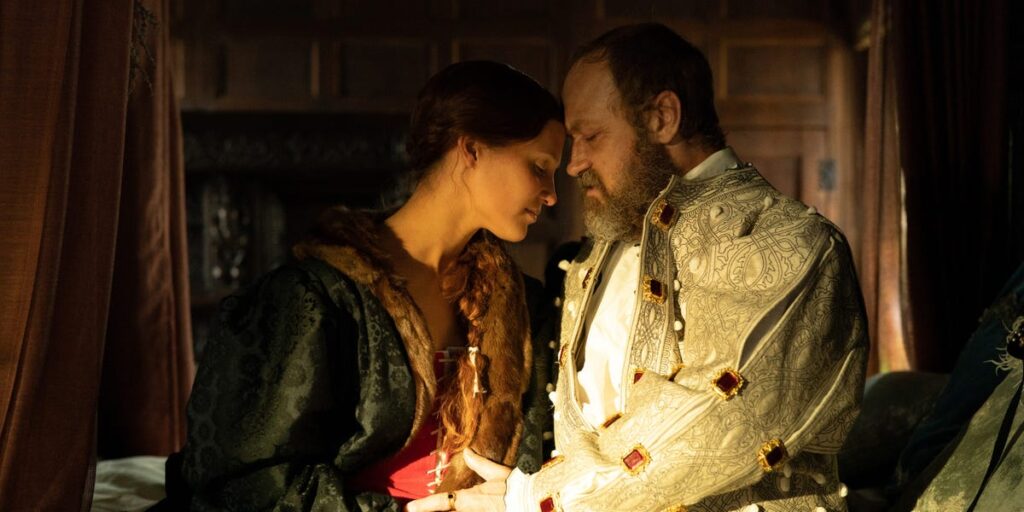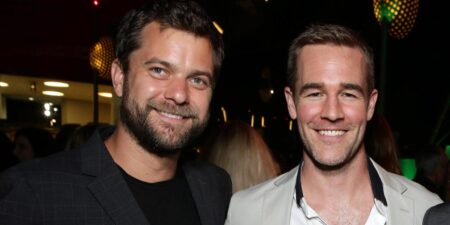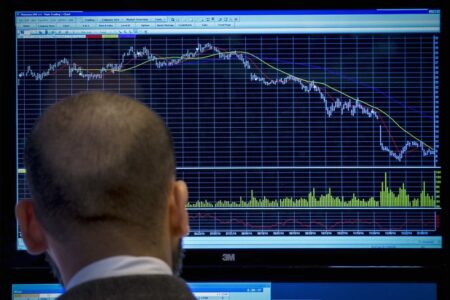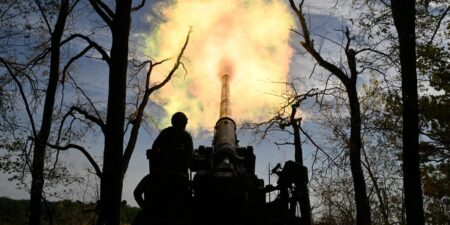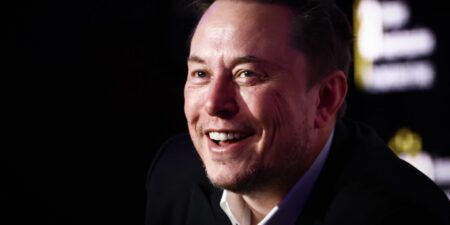Jude Law was already a major star with two Oscar nominations under his belt when he played Count Alexei Alexandrovich Karenin in Joe Wright’s 2012 film “Anna Karenina.”
Alicia Vikander, on the other hand, was near the beginning of her career — and four years away from her Oscar win for “The Danish Girl” — when she had her breakout role playing the supporting character Kitty in the same movie.
Over a decade later, the two have reunited for “Firebrand,” director Karim Aïnouz’s film about King Henry VIII’s sixth and final wife, Katherine Parr.
The movie spotlights the lesser-explored Parr, whose story hasn’t been told, and retold, the way the Tudor royal’s other wives have (read: Anne Boleyn). Giving a revisionist history of their relationship (and Henry’s death), “Firebrand” places Parr’s accomplishments within a more modern feminist context. For instance, she’s considered the first Englishwoman to print an original work under her own name in English.
“Karim has done a really great job of looking at the past in a way that makes it feel incredibly relevant on so many levels — the abusive relationship, the power and strength, the wit of this woman, and the appalling behavior of this man in power,” Law told Business Insider.
For Vikander, it was a no-brainer to sign onto the project when she learned Law was involved, telling BI she “had this instant feeling” she had to do it.
And even though Law went to great lengths to capture the truly “appalling” nature of the king, who manhandles Katherine and others throughout the film, the two had a surprising amount of fun making it.
In a joint interview, the two discuss what it was like making “Firebrand,” from working with Law’s decaying-body perfume to the movie’s unexpectedly “hilarious” sex scenes.
Jude, I read you worked with someone to get that decaying-body smell just right. What were the ingredients that went into creating that kind of stench?
Jude: I have no idea. I just know it was repulsive. But it sort of summed up the state he was in, I think, emotionally and spiritually and physically at that time: decaying and disgusting.
Alicia, what was that like for you, being up close and personal with that smell?
Jude: She got used to it.
Alicia: I didn’t really, it was that bad! I’d never really had that kind of incense on set before, but I work…a lot with music. I always keep my AirPods close and have them in between takes.
With music it’s the same kind of thing as with smell. It kind of just instantly emotionally takes you somewhere…Joe Wright actually did that on “Anna Karenina” too. He used to play music, like techno, over the scenes in take just to give us a vibe.
Jude: And the animals on set obviously brought their own odor.
Was this the first time either of you have used smell to get into a character, to get into a mindset?
Jude: I use it quite a lot because, as Alicia said, it’s a really good way of… You’ve got to step into these characters every day. And so sometimes if you can do something that just is, not really a shortcut, but it’s about really finding a place. It’s a ritual, and it can just put you in a certain frame of mind or mood. It can help or it certainly helps me.
There are a lot of frankly kind of gross sex scenes that really drive home just the unbalanced, fraught nature of Henry and Katherine’s relationship. Henry had previously beheaded two of his wives and was, at this point in his life, a little unstable, to put it lightly. How was it filming those intimate scenes?
Jude: I mean, there’s always a certain awkwardness, but it’s also hilarious, I mean, as I’m remembering it. There’s something hilarious about when you’re playing someone who’s in that kind of physical shape and who is also wielding so much power. There were certain moments where you can’t help but be slightly embarrassed.
Alicia: But that’s also the interesting part because they’re people. You realize that even this man with this power, he will still have it creep up on him in those extremely intimate moments that she was there for. She knows that she sees him in this position and she needs to show him that that doesn’t take away from his image and it doesn’t ruin it.
Jude: It ultimately gives her the upper hand. They were key moments, really, looking back to understanding Katherine’s patience and her ability to navigate this relationship to her benefit and ultimately to her advantage.
Did you guys have an intimacy coordinator on set for those sequences?
Alicia: I’ve had it since the world changed.
Jude: Caught up.
Alicia: I’ve now had it on every film I’ve done.
Jude: Me too, and they’ve only gotten better and better. She was particularly good on this one, I remember because it didn’t just apply to sex scenes. I made this decision early on that I really wanted Henry to manhandle people, men and women and the animals, and treat them all the same — as if he owned them and could touch them and prod them and poke them, investigate them.
So I had to make sure everybody who came within range of me knew that that was what was going to happen. And if they didn’t want that to happen, they had to be very clear about it. Once that’s dealt with, you are able to perform; you’re able to lose yourself in a moment.
Alicia: And I notice, above anything, it is a way to get the directors to actually talk about it. In the room, the first thing they do is go, “OK, Mr. or Ms. Director, what do you want? Can you explain it in detail?” And that’s when they’re like, “Oh…” And that’s been sometimes the issue before — that they just kind of let you figure it out, which is not cool.
Now, I can’t believe we didn’t always have it because it’s so weird, so strange.
Alicia, you mentioned that intimacy coordinators would’ve helped earlier in your career. Was there ever an instance for either of you in an intimate scene earlier in your career where, looking back at it, you’re like, “Oh, that one in particular really could have benefited from an intimacy coordinator”?”
Alicia: Yes, I definitely had that in the beginning of my career. I had an incident when I was on set, and I don’t blame one particular person — everyone was super professional. But it’s that thing when you’re on a film shoot, and there’s not much time, and there’s a lot of shots that need to be done in a day and everyone’s trying to figure out their stuff. And I was left without anything on, just a little piece of fabric square, and sat on that floor for about 10 hours, two days in a row with not anything on.
I was like, I’m very professional. I’m doing my job. Everyone’s very professional with me but it’s like — this is strange, and it kind of just creeped up on me. And it was not until the second day when I was in the car on the way back and it kind of, then I physically, I had a reaction to it.
Jude: Because you dealt with it and suppressed it and obviously something like that comes up eventually.
How old were you when that happened?
Alicia: My early 20s.
You two worked together before, in 2012’s “Anna Karenina,” which was near the beginning of your career as an international star, Alicia. What was it like for you to reunite a decade later on “Firebrand”? Did each of you understand how the other had changed as an actor during that time?
Jude: I’d obviously followed her work and seen the majority of it… I think you share a potential, share the promise of the potential of something.
And it was pretty clear to me very, very early on that we were both invested in this and in Karim and excited by it, and we had a very, very quick rapport and a sense of trust, and that just grew and grew and was also fun.
We’ve mentioned this a few times, but it sounds odd, perhaps perverse to some, but when you are delving into this kind of dark material, it helps to also kind of relish it. And there’s got to be a sense of humor, weirdly, to survive it, I think, and to feel safe.
I’ve said this so many times, but I was just so bowled over by how brave and just up for the challenge Alicia was. It always felt every day like, OK, we’ve gone this far, how much further can we go? And I don’t just mean in the physical way, I mean emotionally and in truth.
And for a lot of it, a two-hander, it felt that the two of us were trying to navigate this relationship at the core, and it always felt like we could do more or let’s keep looking and simplifying. And that’s a wonderful experience to have as an actor.
Alicia: When I worked with Jude on “Anna Karenina,” I just remember him being so, kind of, considerate and open and he really took the time for someone like me — who did my first job — to make me feel safe and welcomed and dare to even step onto the stage in front of these people. That was a huge part of why I wanted to do this project because I knew that Jude was attached.
I think we just said hi a few times over the years, and I know your work and I had this instant feeling. I could feel, with the amount of preparation for this role and what you were going to achieve doing Henry, that I just wanted to, kind of, come in and be a part of it and collaborate with you. It was really something that really drew me to this.
And like you said, we did have a lot of fun along the way.
Having followed one another’s careers between “Anna Karenina” and “Firebrand,” do each of you have a favorite role of the other’s?
Alicia: I did shoot him a text just like two weeks ago because I was on Netflix — as you do, when you put babies to bed in the evening — and “The Talented Mr. Ripley” came up first thing on the screen. And I rewatched it and I [was] just like, “Wow, you’re so good in it.”
Jude: It was a lovely text to get!
I’m so bad at choosing favorites. I mean the physicality and just the evolution in “Ex Machina” is absolutely amazing, but “The Danish Girl” also has this really grounded open heart, which is something you do so well. It’s like a really human quality there, but it’s sort of effortless. …I mean, I found that film heartbreakingly moving, and you are the sort of heartbeat of it.
And then I recently just saw “Irma Vep” as well, which is insane and brilliant. It’s so bloody funny. It’s one of those things where I watched it just sort of thinking, “Was this made for me?” Because it’s so quirky and also a bit of my life.
Jude, in another interview, you have one line that’s getting quite a lot of pickup. You joked about wishing you didn’t try to play against your looks when you were younger now that you’re, as you called yourself, “saggy and balding.” Were there any roles you were offered in your younger days when you were trying to play against your looks that you turned down because you didn’t want to just do handsome guy stuff?
Jude: In my 20s, people were trying to steer me toward more sort of…romantic comedies and play the good-looking boyfriend, or the lover — and it just wasn’t to my taste.
I really wanted to try to mine drama and so I think I just gave myself a hard time mentally. Like, “OK, how can I steer this away from him being attractive or how can I steer this character away from being seen as good-looking or attractive?”
And I just remember putting so much time there into it and I look back when I was 25, and I’m like, “God, you were really cute. You were really pretty. Just enjoy it, mate.” Because now it’s like, “OK, how can I make myself look young again?”
But that’s just also one of those lessons I guess you learn after time. The memory we all probably have…in [our] 20s, where you think, “Oh, I won’t go out tonight because I look really tired, or “Oh, I better not go to that place because I’ve got nothing to wear.” You look back and go, “Go out! Go and enjoy yourself. You’re 23, you’ll be fine.”
Jude, two of your older kids are following in your footsteps now, is that right?
Jude: Yeah, well, certainly my son. My eldest son [Raff] is working hard. He’s just done another film with Glen Powell, actually, in South Africa.
I’m immensely proud. I just have great respect for anyone who is in the arts or puts themselves out there. There’s such a vulnerability to it, and it requires such passion and self-motivation and belief and bravery.
It’s also jolly nice to be able to really share my enthusiasm and now experience, I suppose, in a way with him on the same level. It’s a really beautiful thing, actually.
This interview has been edited and condensed for clarity.
“Firebrand” is now in theaters.
Read the full article here






